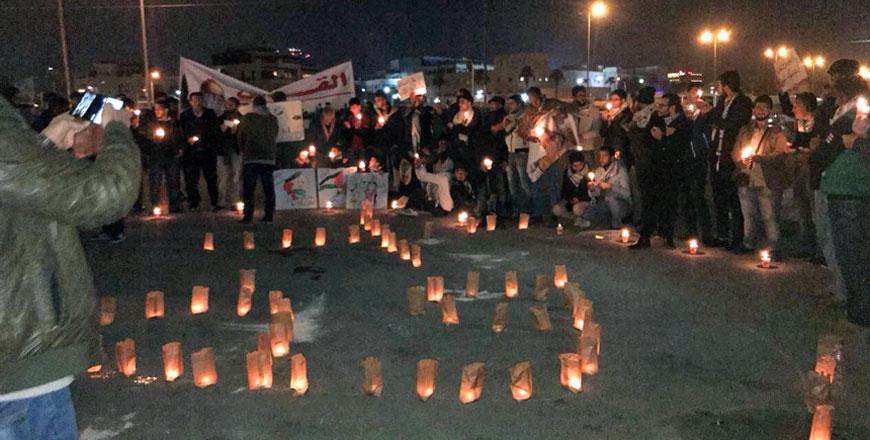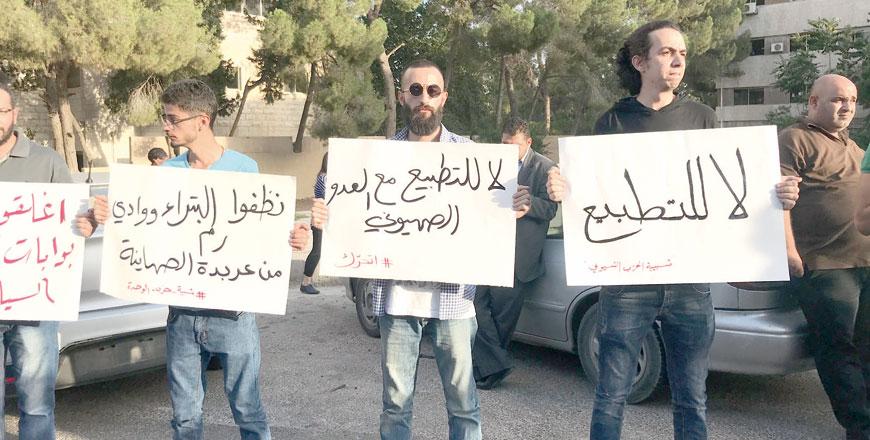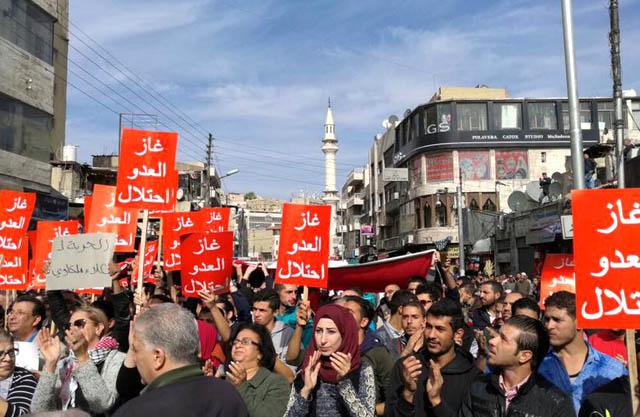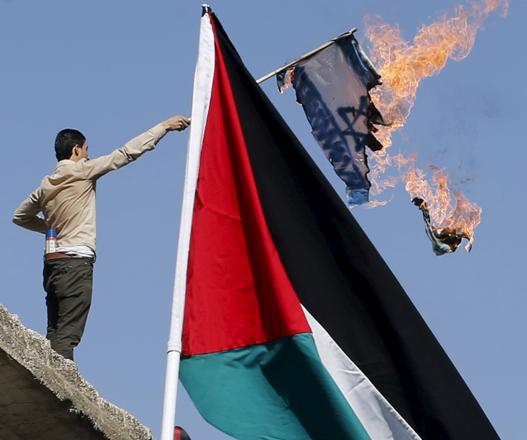You are here
‘2017 witnessed assertive activism and increased political awareness’
By Suzanna Goussous - Jan 13,2018 - Last updated at Jan 14,2018

Activists protest against US President Donald Trump's decision to relocate the US embassy from Tel Aviv to occupied Jerusalem near the US embassy in Abdoun recently (Photo by Suzanna Goussous)
AMMAN — Pushed by a number of local and regional political and economic upheavals during last year, 2017 saw an increased political activism and boycott movements, raising social, political, and economic awareness among Jordanians.
Thirty-eight days after the US’ decision to move its diplomatic HQ from Tel Aviv to occupied Jerusalem, Jordanians are still taking to the streets to express their rejection of the decision, with activists and citizens protesting in front of the US embassy in Amman turning into a “regular fixture”.
Mohammad Absi, head of “Etharrak” anti-normalisation campaign and member of Al Wihda Popular Party, said 2017 was eventful as political activists in Jordan stood in solidarity with activists in neighbouring countries and supported their movements.
“The year [2017] started with the solidarity move with the hunger strike of Palestinian prisoners in Israeli jails when many Jordanians took a stand and opposed the mistreatment of Palestinians and Jordanians in Israeli prisons,” Absi said in remarks to The Jordan Times.
“A solidarity assembly was organised for more than a month earlier last year with many activists and political parties representatives coming together to show solidarity with the Palestinians who suffer on a daily basis in Israeli prisons.”
Although boycotts are the “most challenging” when it comes to political movements, Etharrak campaign had “one of its most fruitful years”, he said.
In June, he said, the campaign contributed to stopping the screening of the “Wonder Woman” film in Jordanian cinemas as it starred Gal Gadot. As the actress was enlisted in the Israeli army for two years after high school, political activists, boycott movements and political parties called for banning the screening of the movie in Jordan.
The movie was banned from screening in several Arab countries in a statement against the “normalisation of ties with Israel”, including in Lebanon, Tunisia, and Algeria. “That was among the major accomplishments of 2017,” he said.
Jumana Ismail, founding member of the Jordan BDS (Boycott, Divestment and Sanctions movement), said the boycott culture gained more momentum and popularity in 2017, adding that a key mission of the BDS is to instill the “culture of boycotting” among school and university students.
After celebrating three years of its launch, Ismail said that “the Jordan BDS is currently working towards raising social awareness among individuals and the younger generation of Jordan, despite the changes in the curricula after the peace treaty [with Israel] and changes on the local and international levels”.
Jordan BDS is now a partner with 103 organisations that believe in the culture of boycott and its importance, Ismail said, adding that Jordan BDS succeeded in reaching 11 local companies to end their cooperation with G4S Security Company that serviced the separation wall in occupied Palestine and trained Israeli soldiers in occupied Jerusalem.
Omar Awad, member of the Jordanian Communist Party, said the highlight of political movements in 2017 was the decision of US President Donald Trump to move the US embassy to Jerusalem and to recognise the occupied city as the capital of Israel.
He said the political activists considered the move as an “aggression on the Palestinian and Jordanian territorial integrity”.
The attack on the two Jordanian citizens in the building that belonged to the Israeli embassy in Amman in July also affected the way Jordanians view Zionist policies carried out in the occupied land, Awwad said.
“What made people more furious was the Israeli government’s reaction and [Israeli Prime Minister Benjamin] Netanyahu receiving the murderer as a hero, which also emphasised the notion that the Israeli occupation does not have respect towards international and regional agreements and peace treaties,” he told The Jordan Times.
“The gas deal with the Israeli government, the Israeli embassy incident and Trump’s Jerusalem move should all be used as tools to pressure both Israel and the US for their disrespect of the international law,” he said.
“As Jordanian activists, we were more assertive than ever that we [Jordan] needed to revise our foreign policy.”
“The incidents that occurred this year on the local, regional, and international levels emphasise one thing: It is about time we widen our horizons and welcome new allies on the regional level,” Awwad noted.
“Boycott movements only mean that there is an overall social disapproval among the people... disapproval of the foreign policies that normalise ties with Israel,” he added.
There was an “improved cohesive performance of Jordanian parties and more cooperation on all levels” through conferences fighting social discrimination and fighting normalisation with the Zionists”.
Political activist Hanadi Dweik of the Nationalist Movement Party (Al Haraka Al Qawmiyyah) said 2017 saw more youngsters taking part in protests to demand rights and boycott of Israeli products.
“We noticed there is a positive trend among the youth this year [2017]. Even those with no political backgrounds took to the streets and participated in protests, because they felt there is a threat to sacredness of the occupied city of Jerusalem,” Dweik said.
“People are more aware about the boycott movements because they understand any decision regarding Palestine from the West will be contributing to the compromise of Jordan and its people.”
Dweik told The Jordan Times that activists must also demand more changes on the school and university curricula to include more lessons on the history of the Levant, in order to understand the present day political events.
“It is when we understand the history of Jordan, Palestine and the Levant; its culture and heritage, we can defend, resist the occupation, protest and boycott Zionist produce and any agreements signed with the Israeli government,” the activist said.
From an Islamist bloc, an activist, who preferred anonymity, stressed the importance of taking protests to the streets and expressing solidarity with Palestinians and Jerusalemites.
This year, he said the boycott campaigns will work more on strengthening field work and fill the gaps present.
‘United we stand’
Absi added that the 2018 budget approved by the government will “spark more discussions and demands from the political activists”, in addition to the gas deal, which is still on the table, he said.
“The 2018 budget targets Jordanians from all social classes as it will affect all families and is unjust,” the activist added.
Activists agreed on the need for more cooperation and discussions on the 2018 budget.
Ibrahim Taleb, an activist, said the performance of Parliament over the past year “did not reach the minimum effort expected”, adding that the “younger generation became more familiar with the Palestinian cause, despite international efforts to normalise with Israel”.
“No matter what the world will say, I think we proved to everyone this year that we will stand united always and resist apartheid systems,” the 23-year-old said.
Related Articles
AMMAN — Activists on Tuesday organised a sit-in in front of the Ministry of Tourism to denounce “promoting normalisation of tourism with the
AMMAN — Celebrating three years of resistance and awareness raising on Israel’s “apartheid projects” in Palestine earlier this week, Jordan’
AMMAN — The national Boycott, Divestment and Sanctions (BDS Jordan) movement has called on Jordanians to maintain a stance against the Israe



















